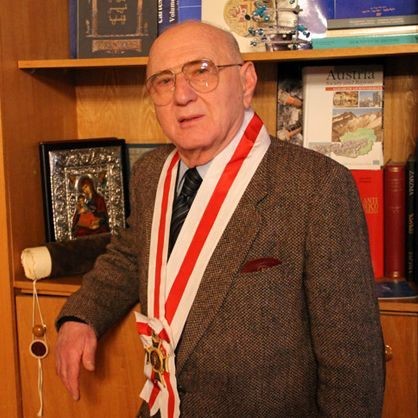Gamkrelidze Tamaz

Tamaz Gamkrelidze (b. October 23, 1929, Kutaisi – d. February 10, 2021, Tbilisi) was a linguist, public figure, full member of the Georgian National Academy of Sciences (1974), full member of the Academy of Sciences of the Soviet Union (1984), Honored Worker of Science of Georgia (1979), winner of the Humboldt Research Award (Germany, 1989). In 2005–2013, he was the President of the Georgian National Academy of Sciences, and from July 2013 until his death – the Honorary President of the same Academy.
He graduated from the Faculty of Oriental Studies of Tbilisi State University (TSU) with a degree in Semitology (1952). After graduating from the university, he began working at the Institute of Linguistics, and he mastered the basics of Semitology under the guidance of Academician G. Tsereteli at TSU. On the initiative of G. Tsereteli, he was sent to Leningrad (present-day St. Petersburg) and he studied ancient Eastern languages: Akkadian, Urartian, Hittite, and others, under the guidance of Professor I. Dyakonov.
He was engaged in scientific and pedagogical activities at the Giorgi Tsereteli Institute of Oriental Studies and TSU. In 1973–2005, he was the director of the same institute, then – honorary director and chairman of the scientific board; From 1966, he headed the Department of Structural and Applied Linguistics of TSU (from 1999 – Department of General and Applied Linguistics, then the National Institute of Theoretical and Applied Linguistics).
Gamkrelidze’s contribution to the development of Kartvelology, Georgian Oriental Studies and Indo-European Studies is outstanding.
Gamkrelidze researched issues of Orientalism and theoretical linguistics, ancient oriental languages, Indo-European, Semitic and Kartvelian languages, and their structure and theory. In 1956, he defended his candidate thesis “Non-Indo-European Elements of the Hittite Language”, and in 1963 – the doctoral dissertation “Hittite Language and Laryngeal Theory”. He developed his own “laryngeal theory”, which concerns the long-term process of the formation of Indo-European phonemes. With these works, Gamkrelidze emerged as the best researcher of historical-comparative issues of Indo-European languages and fundamental problems of Hittitology.
By incorporating the latest methods of structuralism and general typological research into the methodology of comparative studies, Gamkrelidze analyzed the structure of the Kartvelian languages in a completely new way. This was confirmed by his very first work in the comparative phonetics of the Kartvelian languages — “Sibilant correspondences and Some Questions of the Ancient Structure of the Kartvelian Languages” (1959). The result of the general methodological and linguistic significance of this work is known as “Gamkrelidze's Law”.
A completely new stage in the study of the Kartvelian languages is the fundamental monograph “The System of Sonants and Ablaut in the Kartvelian Languages” (1965, co-authored with G. Machavariani). The authors proposed an essentially new concept of the historical grammar of the Georgian languages, and it was a new scientific paradigm from a theoretical point of view, thus making this monograph a major event in international comparative linguistics and diachronic studies. The work was translated and published in German.
Gamkrelidze's monograph “Alphabetical Writing and the Old Georgian Script. Typology of Writing and the Origin of Alphabetic Script” (1989; in English – 1995) is devoted to the analysis of the structure and history of the Georgian script. The systematic analysis of the Georgian script and its structural-typological comparison with the old Semitic and Greek scripts made clear the correspondence of the Georgian alphabet with the alphabets of other systems and determined its typological place among the scripts of the early Christian period (Coptic, Gothic, Old Armenian, Old Slavic).
Of particular importance among Gamkrelidze's works is the two-volume monograph “Indo-European and the Indo-Europeans. A Reconstruction and Historical Analysis of a Proto-Language and Proto-Culture” (1987, in Russian, co-authored with V. Ivanov; in English, Berlin-New York, 1994–1998; 1988 – Lenin Prize). The work puts forward a completely new theory about the nature of the Indo-European language and the original habitat of the Indo-Europeans. The so-called glottalic theory, which was taken as the basis of this theory, was a fundamentally new scientific paradigm in the comparative and typological study of Indo-European languages.
Gamkrelidze was a foreign honorary member of a number of academies and societies around the world: the American National Academy of Sciences (Washington), the American Academy of Arts and Sciences (Cambridge), the European Academy of Sciences (London), the British Academy (London), the Linguistic Society of America (Washington), Societas Linguistica Europaea (President 1986), and etc.; He was also an honorary doctor of the Universities of Bonn and Chicago.
In 1992, Gamkrelidze was awarded the I. Javakhishvili Prize. He also received the Order of Honor of Georgia (1999) and the Order of Excellence (2020, highest award of the Georgian Church, the “Golden Order of St. George” (2013). In 2000, he was elected an Honorary Citizen of Tbilisi.
Gamkrelidze combined creative activity with state and public activities. He was a member of the Supreme Council of the Republic of Georgia and the Parliament of Georgia of several convocations (1990–1992, 1992–2003). Gamkrelidze, as a member of the Supreme Council of the Republic of Georgia, signed the “Act of Restoration of State Independence of Georgia” (1990, 28. X. ); He was a member of the Georgian delegation to the Congress of People's Deputies of the USSR in Moscow in 1989 (25. V. – 9. VI.), where he delivered a speech about the dramatic events of April 9 in Tbilisi and exposed the Soviet political and military leadership.
Literary works: სიბილანტთა შესატყვისობანი და ქართველურ ენათა უძველესი სტრუქტურების ზოგი საკითხი, თბ., 1959; დეზაფრიკატიზაცია სვანურში. „გადაწერის წესები“ დიაქრონულ ფონოლოგიაში, თბ., 1968; თეორიული ენათმეცნიერების კურსი, თბ., 2008; რჩეული ქართველოლოგიური შრომები, თბ., 2000; რჩეული წერილები და გამოსვლები, თბ., 2014.
A. Arabuli


